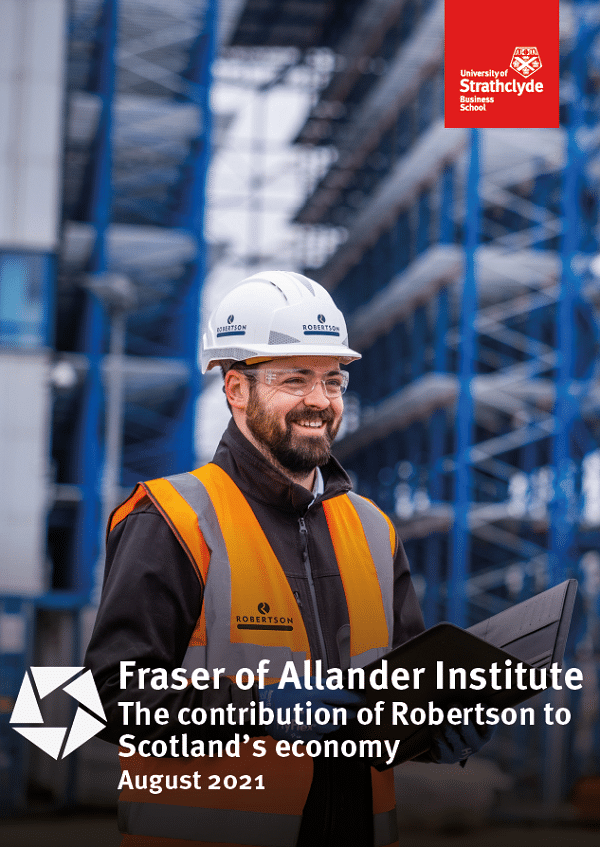Robertson is one of the largest family-owned construction, infrastructure, development and support services businesses in the UK.
With over fifty years of experience across a diverse group of sectors and projects, Robertson has a significant impact on the Scottish economy.
This report evaluates Robertson’s economic contribution to Scotland in terms of the jobs and Gross Value Added (GVA) its activities support.
We find that, once spill over effects are accounted for, Robertson’s spending, from 2017/18-2019/2020, is estimated to have supported –
- a total of over £1.8bn in Scottish GVA; and,
- Over 11,200 Full-time Equivalent (FTE) Scottish Jobs on average annually.
Robertson has eight main divisions across Scotland. Of these, investment from the Major Projects division supports the greatest amount of employment and economic activity across the Scottish economy.
This report finds that the collective investment from Robertson’s Major Projects, Specialist and Civils divisions, from 2018/19 – 2020/21, is estimated to have supported –
- Almost £400m in Scottish GVA; and,
- Just under 2,500 FTE Scottish jobs on average annually.
But, Robertson’s contribution to the Scottish economy extends beyond these traditional economic metrics.
Robertson is committed to supporting the economy’s fight against climate change. Additionally, Robertson’s focus on local supply chains and investing in Scottish communities provides employment and earnings opportunities in some of the most deprived areas in Scotland, helping Scotland tackle its inequalities grand challenge.
For example, Glasgow and Dundee are the 1st and 4th most deprived local authorities in Scotland according to the Scottish Index of Multiple Deprivation (SIMD 2020).
This report finds that –
- During the period 2018/19-2020/21, Robertson’s Scottish divisions spent over a fifth of their expenditure in Glasgow and Dundee City.
- Robertson’s Stirling and Dundee offices are located in two of the 20% most deprived areas in Scotland.
This report assesses Robertson’s economic contribution alongside its wider impact to highlight this construction firm’s role in the Scottish economy.
Authors
Adam is an Economist Fellow at the FAI who works closely with FAI partners and specialises in business analysis. Adam's research typically involves an assessment of business strategies and policies on economic, societal and environmental impacts. Adam also leads the FAI's quarterly Scottish Business Monitor.
Find out more about Adam.
Ben is an economist at the Fraser of Allander Institute working across a number of projects areas. He has a Masters in Economics from the University of Edinburgh, and a degree in Economics from the University of Strathclyde.
His main areas of focus are economic policy, social care and criminal justice in Scotland. Ben also co-edits the quarter Economic Commentary and has experience in business survey design and dissemination.
Mairi is the Director of the Fraser of Allander Institute. Previously, she was the Deputy Chief Executive of the Scottish Fiscal Commission and the Head of National Accounts at the Scottish Government and has over a decade of experience working in different areas of statistics and analysis.

Frantisek Brocek
Frank graduated from the University of Strathclyde in 2019 with a First-class BA (Hons) degree in Economics. He is currently studying on the Scottish Graduate Programme MSc in Economics at the University of Edinburgh.
He has experience from a variety of economic policy institutions including the European Commission in Brussels, the Slovak Central Bank and the Ministry of Finance.
James is a Fellow at the Fraser of Allander Institute. He specialises in economic policy, modelling, trade and climate change. His work includes the production of economic statistics to improve our understanding of the economy, economic modelling and analysis to enhance the use of these statistics for policymaking, data visualisation to communicate results impactfully, and economic policy to understand how data can be used to drive decisions in Government.




